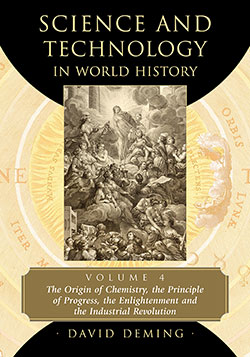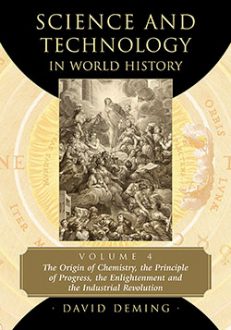Science and Technology in World History, Volume 4
The Origin of Chemistry, the Principle of Progress, the Enlightenment and the Industrial Revolution
$39.95
In stock
About the Book
The history of science is a story of human discovery—intertwined with religion, philosophy, economics and technology. The fourth in a series, this book covers the beginnings of the modern world, when 16th-century Europeans began to realize that their scientific achievements surpassed those of the Greeks and Romans. Western Civilization organized itself around the idea that human technological and moral progress was achievable and desirable. Science emerged in 17th-century Europe as scholars subordinated reason to empiricism. Inspired by the example of physics, men like Robert Boyle began the process of changing alchemy into the exact science of chemistry. During the 18th century, European society became more secular and tolerant. Philosophers and economists developed many of the ideas underpinning modern social theories and economic policies. As the Industrial Revolution fundamentally transformed the world by increasing productivity, people became more affluent, better educated and urbanized, and the world entered an era of unprecedented prosperity and progress.
About the Author(s)
Bibliographic Details
David Deming
Format: softcover (7 x 10)
Pages: 340
Bibliographic Info: notes, bibliography, index
Copyright Date: 2016
pISBN: 978-0-7864-9403-3
eISBN: 978-1-4766-2504-1
Imprint: McFarland
Table of Contents
Preface 1
1. From Alchemy to Chemistry 3
Prehistorical Chemical Technology 3
Chemistry of the Greeks and Romans 20
Nature of Alchemy 31
Alexandrian Alchemists 36
Alchemy and Chemical Technology in China 43
Islamic and Arabic Alchemists 47
Alchemy in Europe 53
Decline of Alchemy 65
Jan Baptist Van Helmont 71
Robert Boyle 82
Antoine Lavoisier 104
2. The Principle of Progress 120
Progress as Eidos 120
Greek and Roman Conceptions of History 120
Doctrine of Divine Providence 124
Doctrine of Decay 127
Anticipations of Progress in the 16th and 17th Centuries 128
3. The Enlightenment 138
Age of Reason 138
John Locke 139
Pierre Bayle 145
Voltaire 168
Montesquieu 171
Apostles of Progress 173
David Hume 176
Jeremy Bentham and Utilitarianism 191
Social and Economic Theories 194
The Encyclopédie 206
The Noble Savage 216
4. The Industrial Revolution 226
A Fundamental Transformation 226
Conditions in Europe Prior to the Industrial Revolution 227
The Agricultural Revolution 233
Improvements in Transportation 237
Why England? 238
Synergy, Science, and the Steam Engine 243
Child Labor 249
Post-Mortem 255
Conclusion 259
Chapter Notes 261
Bibliography 308
Index 322






